Compression socks are specially designed to provide consistent pressure on the legs, promoting healthy blood circulation and preventing the development of certain conditions such as deep vein thrombosis or varicose veins.
These benefits can make it tempting to want to wear compression socks around the clock, leading to the question – can you sleep with compression socks on?
While there is no definitive answer that applies to everyone, several factors can influence whether or not it is safe and beneficial for an individual to sleep with compression socks.
For some individuals, such as those with lymphedema or chronic venous insufficiency, wearing compression socks during sleep might be recommended to reduce swelling and provide relief.
On the other hand, those with no medical concerns related to their legs may not see the need for prolonged wearing.
Overall, the choice to sleep with compression socks on will largely depend on the individual’s specific health needs and the advice of their healthcare provider.
It is essential to consult a professional before making such a decision to ensure optimal safety and effectiveness.
In this article, we will explore the reasons behind this recommendation, as well as instances where wearing compression socks at night might be needed.
Benefits of Wearing Compression Socks
Wearing compression socks has numerous benefits. They work by gently squeezing the leg in a graduated manner, applying the most pressure at the ankle and gradually decreasing the pressure as they move up the leg.
The pressure from the compression socks increase blood flow. By compressing veins, the socks help to move blood upward, counteracting the pull of gravity. This can prevent blood from pooling in the lower extremities, leading to minimized leg swelling and reduced risks of blood clots and deep vein thrombosis.
Another important benefit of compression stockings is the support they provide to muscles and the alleviation of fatigue. The enhanced circulation the socks offer means that essential nutrients and oxygen are delivered to muscles more efficiently, allowing for quicker recovery and reduced muscle soreness after physical activity.
I really love to wear compression socks on flights. It makes my legs feel much more alive the day after.
Due to their construction and snug fit, compression socks can provide stability to the leg muscles and reduce vibrations. This is particularly useful for athletes or individuals with jobs that require prolonged standing, as it helps maintain comfort and boost the activity in the legs.
Finally, compression socks can help in managing various chronic disorders, such as varicose veins or lymphedema. The improved circulation these garments offer is beneficial for these conditions, as it ensures that the blood and fluids within the legs are moved out more efficiently, leading to decreased symptoms.
The wide range of products available in the market offers numerous options for individuals seeking the benefits of compression sock therapy. Proper fit, suitable compression levels, and high-quality materials are crucial considerations to make when selecting the ideal pair of compression socks to achieve optimal results.

Pros
Sleep with compression socks may offer some benefits, depending on your specific needs and circumstances:
- Reduced swelling: If you are suffering from edema or swollen feet, wearing compression socks at night could help to reduce swelling overnight by promoting better blood circulation in your legs.
- Varicose vein relief: Nighttime use can reduce discomfort and pain associated with varicose veins by aiding blood flow back to the heart (Harvard Health).
- Recovery from workouts: Athletes may wear compression socks while sleeping to aid recovery from intense physical activity, as improved blood flow helps to remove waste products from muscles more efficiently (Pubmed).
Who Should Consider Sleeping with Compression Socks?
Since it’s most common to wear compression socks during the day, we would like to discuss who should consider sleeping with compression socks.
We will be focusing on athletes and people with specific medical conditions.
Athletes
Athletes often experience muscle fatigue and soreness after rigorous training or competition.
Wearing compression socks while sleeping can help improve blood circulation, reduce muscle inflammation, and potentially aid in recovery.
Shoes that offer gentle compression may contribute to better athletic performance the following day by promoting oxygenation and nutrient delivery to the muscles.
Nevertheless, it is important for athletes to consult a healthcare professional or sports therapist before incorporating the routine use of compression socks during sleep, as individual needs and circumstances may vary.

People with Medical Conditions
Individuals with specific medical conditions may benefit from wearing compression socks during sleep.
For instance, those who suffer from venous insufficiency or varicose veins can experience improved blood flow and reduced discomfort by wearing compression stockings at night.
Additionally, patients who have recently undergone surgery or are at risk of developing blood clots might find the use of compression socks during sleep beneficial in preventing deep vein thrombosis (DVT).
However, if you have a medical condition it is crucial to consult your healthcare provider before deciding to sleep with compression socks.
Compression socks come in various levels of compression, ranging from mild (8-15 mmHg) to extra firm (40-50 mmHg). A healthcare professional can recommend the appropriate level of compression for individual needs.
Potential Side Effects and Concerns with Compression Socks
Wearing compression socks can provide numerous benefits to individuals, especially those with certain leg and foot conditions.
However, there are also potential side effects and concerns that one should be aware of before sleeping with compression socks on.
Firstly, consult a healthcare professional before wearing compression socks to bed. It’s essential to consider some precautions and follow specific recommendations to ensure safety and comfort.
This is especially important if you have any underlying medical conditions.
They can help determine if it’s safe for you to wear compression socks during sleep and suggest the appropriate compression level.
Another crucial aspect is selecting the correct compression sock size.
Wearing socks that are too tight or too loose may cause discomfort and fail to provide the actual benefits.
Measure your leg circumference and refer to sizing charts provided by manufacturers to find the suitable size for you.
Adjust the socks properly on your legs, ensuring they are not twisted, wrinkled, or rolled down, as this might impede blood flow.
Moreover, it’s essential to be cautious while wearing compression socks if you have certain conditions such as:
- Peripheral neuropathy: Impaired sensation in legs and feet may prevent you from noticing any discomfort caused by compression socks.
- Skin infections or open wounds on the legs: Compression socks may aggravate these conditions through direct contact or by trapping moisture against the skin.
- Advanced peripheral arterial disease: Wearing compression socks might worsen this condition by further constricting blood flow to the legs.

It’s essential to maintain proper hygiene and take care of your compression socks.
Wash them regularly according to the manufacturer’s instructions, and replace them as needed to maintain their effectiveness.
One common concern among users is skin irritation. Compression socks apply consistent pressure on the skin surface, which could result in itching, redness, or rash in some cases.
This is more likely to occur if an individual has sensitive skin or if the socks are not properly fitted, as excessive tightness could exacerbate skin issues.
Furthermore, heat retention and sweating may also contribute to discomfort, especially in warmer climates or during summer months.
Avoid wearing socks with holes or worn-out elastic, as they may not provide adequate compression.
These are also potential downsides to wearing compression socks during sleep:
- Discomfort: You might find sleeping in compression socks uncomfortable due to the sensation of tightness or pressure on your legs.
- Overcompression: Wearing compression socks with too much compression or for extended periods may result in overcompression. This could cause nerve damage or blood flow restriction.
- Inappropriate use: If there is no specific need for compression socks, you might not benefit from wearing compression socks during sleep. Make sure to consult a healthcare professional before doing so.
It’s crucial to consider that not everyone may benefit from wearing compression socks at night.
Speak with a health care provider before integrating this practice into your routine, especially if you have a pre-existing medical condition or are currently receiving treatment.
Discuss your specific needs and concerns, and they can determine if this is an appropriate approach for your situation.
Selecting the Right Compression Socks for Sleep
When choosing compression socks for sleeping, it’s crucial to select the right ones to ensure comfort and effectiveness throughout the night. Paying attention to factors like fabrics, styles, and appropriate sizing is vital in making the right choice.
Comfortable and breathable fabrics are essential for a good night’s sleep. Cotton socks, for example, are known for their softness and breathability. However, compression socks made from moisture-wicking materials, such as microfiber or bamboo fibers, can also provide ample comfort. These fabrics aid in keeping your feet dry throughout the night, which is especially beneficial during menopause when hot flashes and night sweats are common.
Various length styles of compression socks are available, and it is essential to choose one that suits your specific needs. For example, knee-high socks provide compression and support to the lower legs, while thigh-high or full-length socks offer extended coverage for those who require more assistance.
It’s also crucial to consider credible sources of information when researching compression socks for sleep. The Cleveland Clinic, a leading non-profit academic medical center, provides reliable and unbiased information about compression socks and their benefits. Avoid relying solely on advertising or claims made by services that may endorse particular products without a proper scientific basis.
Ensuring proper sizing of compression socks is critical for achieving optimal results. Ill-fitting socks may disrupt your circadian rhythm, which could lead to sleep disturbances. Consult with a medical professional or follow measurement guidelines from reputable sources like the Cleveland Clinic to determine the right size for you.
Conclusion
In summary, wearing compression socks during sleep may offer some benefits for certain individuals, such as those with circulatory issues or swelling in the legs.
Positive effects of wearing compression socks to bed may include improved blood circulation, reduced leg swelling, and potentially better sleep quality for people with specific health conditions.
Nonetheless, it is essential to choose the right level of compression and proper fit for your personal needs.
On the other hand, wearing compression socks to sleep may not be the ideal solution for everyone, and in some cases, it can cause discomfort or negative effects on one’s sleep quality.
Overall, the use of compression socks during the night should be a well-informed decision made in conjunction with expert advice.
Remember to prioritize your comfort and health, and be open to exploring various solutions for achieving optimal sleep quality.
Read this linked article if you want to know more about sleeping with compression socks during pregnancy.
